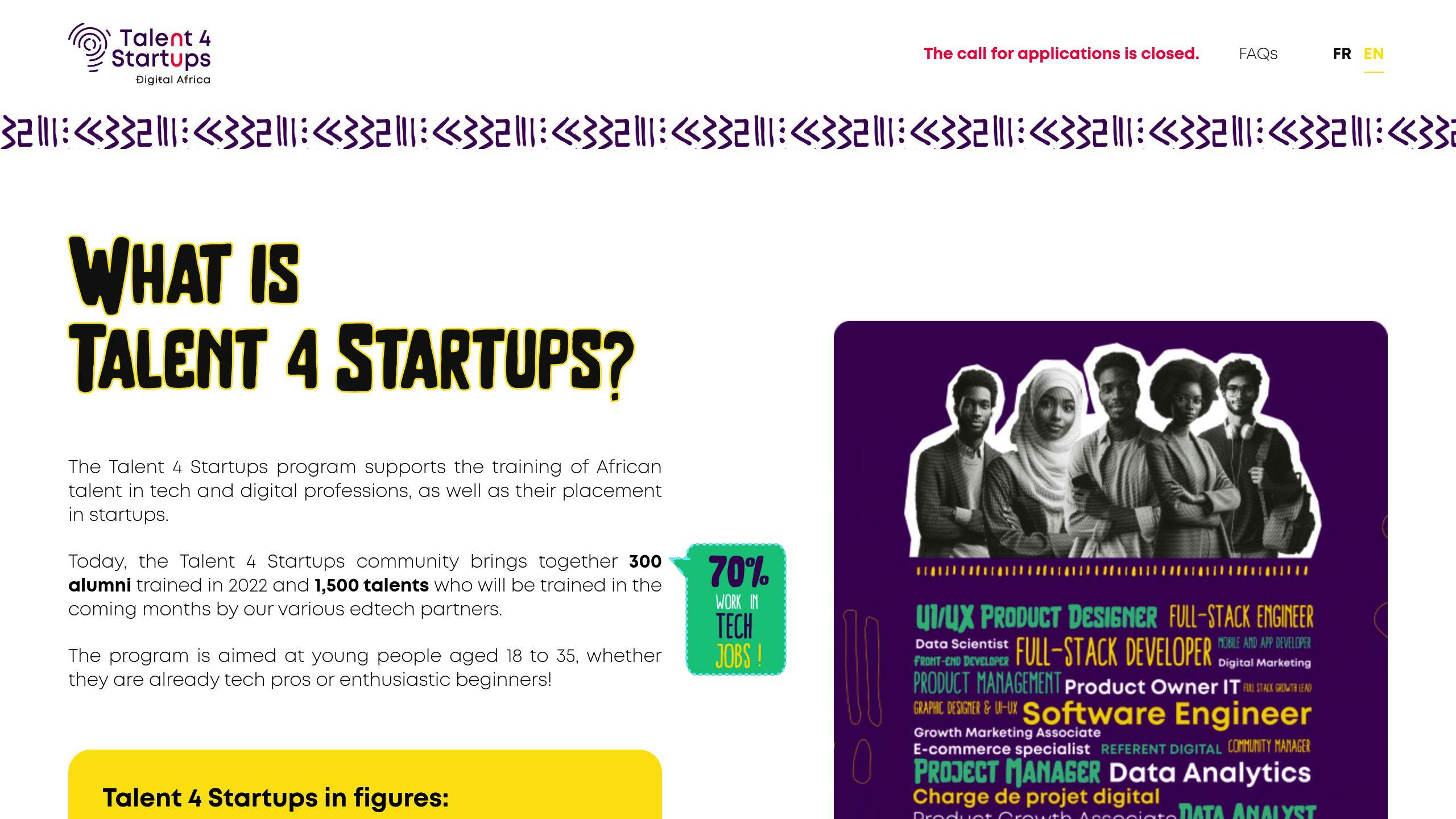Africa’s startup growth is being held back by a lack of digital skills. With African nations scoring between 1.8 and 5 on the Digital Skills Gap Index (far below the global average of 6), startups face challenges like weak technical teams, limited market reach, and missed innovation opportunities.
Here’s the good news: initiatives like GetBundi and Google’s Hustle Academy are stepping in to bridge this gap by offering targeted digital skills training in areas like digital marketing, data analysis, web development, and AI. These programs are helping startups expand into global markets, make data-driven decisions, and create innovative products.
Key Takeaways:
- Skill Gaps: Web development, digital marketing, data analysis, and blockchain are critical areas where expertise is lacking.
- Impact of Training: Startups with trained teams report better productivity, market expansion, and innovation.
- Programs to Watch: GetBundi aims to train 10 million Africans by 2034, while Google’s Hustle Academy has already supported over 1,000 entrepreneurs.
Digital skills are essential for startups to compete globally and solve Africa’s youth unemployment crisis. Training programs are paving the way for a tech-driven future.
Problems: Digital Skill Gaps in African Startups
1. Areas of Digital Skill Shortages
African startups are facing a growing digital skills gap. Only half of African countries have integrated computer skills into their school curriculum, compared to 85% globally [2]. This gap in education has led to a lack of expertise in several key areas:
| Technical Area | Current Challenge | Business Impact |
|---|---|---|
| Web Development | Not enough developers | Limits ability to create digital products |
| Data Analytics | Few skilled professionals | Slows down data-driven decisions |
| Digital Marketing | Lack of specialists | Reduces market reach |
| Blockchain Technology | Minimal fintech knowledge | Missed opportunities for innovation |
The Digital Skills Gap Index highlights this challenge, with African nations scoring between 1.8 and 5 – far below the global average of 6 [2]. Meanwhile, 87% of African business leaders view digital skills development as a top priority for investment [3].
2. Skill Gaps and Startup Growth Barriers
By 2030, Africa will require around 650 million workers to be trained or retrained in digital skills to meet the demand for 230 million new digital jobs [3][4]. This shortage creates significant challenges for startups:
1. Technical and Innovation Challenges
- Weak technical teams make it harder for startups to attract funding, leaving many ideas unrealized.
- Limited ability to create new products or adopt emerging technologies.
- Difficulty scaling operations effectively.
2. Market Expansion Obstacles
- A lack of digital marketing and analytics skills makes it hard to understand trends or customer behavior.
- Ineffective customer targeting and adaptation to market changes.
- Struggles to compete on a global scale.
These gaps are holding startups back from reaching their full potential in the digital economy. Focused training programs could help bridge this divide, enabling African startups to grow, innovate, and compete more effectively in global markets. The importance of such initiatives cannot be overstated in addressing these pressing challenges.
Investing in digital skills to unleash Africa’s digital entrepreneurship and innovation potential
Solutions: Empowering Startups with Digital Skills Training
Digital skills training helps African startups tackle challenges head-on, driving growth and encouraging new ideas.
Training Founders and Teams
Google’s Hustle Academy offers a free, five-day virtual bootcamp designed to teach startups key digital skills [1]. The program focuses on areas like:
| Skill Area | Business Impact |
|---|---|
| Digital Marketing | Expands market reach and attracts customers |
| Data Analysis | Supports better decisions and insights |
| E-commerce | Boosts online sales and revenue |
| Project Management | Improves team coordination and execution |
Similarly, GetBundi provides courses for professionals in fields like data analysis, web development, and AI, helping them master critical technologies [2].
Accessing Global Markets
Building digital skills enables startups to break into international markets. This happens through:
- E-commerce Platforms: Startups can connect with global customers and handle international sales more effectively.
- Remote Work: Digital expertise allows access to global talent and seamless collaboration across borders, addressing local skill shortages and ensuring continuous operations.
Case Study: Talent 4 Startups

Talent 4 Startups showcases the benefits of focused digital training. The initiative has already trained 280 students and plans to support 1,000 more by 2025 through partnerships with industry leaders. This ensures students receive practical, market-ready skills.
Programs like these address technical challenges and open doors to international markets, equipping African startups with the tools needed to compete globally. By blending theory with hands-on learning, they help close the digital skills gap while driving growth across the region.
sbb-itb-dd089af
Programs and Initiatives Addressing Skill Gaps
1. Tech In Africa: Helping Startups Thrive

Tech In Africa offers daily updates on tech breakthroughs and startup developments, keeping entrepreneurs informed about training opportunities and industry trends. By sharing practical resources like training programs, market insights, and success stories, it helps startups improve their digital skills in areas like e-commerce, blockchain, and renewable energy.
While platforms like Tech In Africa focus on raising awareness, other efforts are taking direct action to tackle the skills gap with hands-on training and partnerships.
2. Digital Skills Programs Across Africa
Several key initiatives are addressing Africa’s growing need for digital skills. According to the International Finance Corporation, sub-Saharan Africa could face a gap of around 230 million digital skill jobs by 2030.
The African Union has set an ambitious goal to train 100,000 young people with job-ready digital skills by 2024 [1]. This program not only prepares youth for employment but also creates a skilled talent pool for startups aiming to innovate and grow.
GetBundi’s "Vision 2034" initiative is targeting the training of 10 million Africans in fields like AI, web development, and data analysis. By offering specialized courses, it directly aligns with the needs of startups and tech-driven businesses.
These programs combine classroom learning with hands-on experience, ensuring participants gain the skills needed for the job market. By bringing together governments, private companies, and educational institutions, they aim to deliver training that supports both individual careers and broader business growth.
Impact and Future of Digital Skills Training
1. Measuring Startup Growth
Digital skills training programs are making a noticeable difference in Africa’s startup ecosystem. The Digital Skills Gap Index shows African countries scoring between 1.8 and 5, compared to a global average of 6. However, targeted training is driving positive outcomes:
Job Creation and Workforce Development
- Training programs are equipping startups with skilled teams, boosting employee retention, and preparing for the rising demand for digital jobs across Africa.
- Startups with digitally trained employees report better job satisfaction and increased productivity.
Market Expansion
- Businesses in Google’s Hustle Academy have seen a 25% boost in customer acquisition thanks to improved digital marketing strategies.
- Strengthened digital skills have allowed startups to tap into new markets and grow revenue through online channels.
Innovation Capacity
- Startups trained by GetBundi have introduced AI-powered logistics solutions, highlighting how specialized digital skills can lead to transformative products.
- Enhanced technical expertise has enabled startups to create globally competitive offerings.
2. Challenges and Collaboration Opportunities
While progress is evident, challenges like infrastructure and access continue to limit growth:
Infrastructure Gaps
Limited internet access in rural areas deepens the digital divide, restricting development opportunities for underserved regions.
Collaborative Solutions
Partnerships, such as the African Union’s collaboration with Google, demonstrate how joint efforts can expand the reach and impact of training programs:
- Sharing resources, expertise, and unified training curricula.
- Developing sustainable funding approaches.
- Expanding training access to remote and underserved areas.
Ms. Chido Mpemba, African Union Youth Envoy, highlights the importance of digital literacy and collaboration in empowering young people to actively participate in the economy [1].
Emerging technologies like AI, machine learning, and cybersecurity offer new possibilities for African startups. By tackling these challenges through partnerships and innovative approaches, startups across Africa can thrive in the ever-evolving digital landscape.
Conclusion: Digital Skills and Startup Success in Africa
Developing digital skills has become a key driver for the growth and progress of African startups. Closing the gap in digital expertise is essential to opening up new opportunities across the continent.
GetBundi’s "Vision 2034" highlights how targeted digital training can create widespread, lasting change. Programs like this, along with private sector engagement, are critical to meeting the forecasted demand for 650 million skilled workers in Africa by 2030.
Moving forward, collaboration among various stakeholders is crucial. By addressing these challenges together, African startups are well-positioned to take the lead in the continent’s economic and tech development. EdTech solutions are central to this effort, offering scalable tools that make digital education more accessible and aligned with local needs.
"The future of Africa lies in digital skills. With hundreds of millions who will need training or retraining, this continent’s growth can be accelerated by mastering these essential technologies, which have an increasingly vital role in determining success on the African scene." – Africa Tech Festival [4]
Incorporating digital skills into education is a priority for preparing the workforce of tomorrow. Currently, only 50% of African countries include computer skills in school curricula, compared to 85% globally [2]. This gap presents a significant opportunity for EdTech startups and training programs to bridge the divide between today’s capabilities and the demands of the future workforce.
Through partnerships between governments, schools, and private companies, digital skills training is reshaping Africa into a competitive, tech-focused economy. As startups across the continent continue to grow and innovate, a strong foundation in digital expertise will be essential for sustainable success and global relevance.
Related posts
- Top 7 EdTech Startups for Digital Skills in Africa
- 8 Solutions to Common African E-commerce Challenges
- How Mobile Social Platforms Drive African Startups
- Top 7 African Tech Hubs Building Communities
 We just launched our WhatsApp channel. Want to get the latest news from the Tech in Africa?
We just launched our WhatsApp channel. Want to get the latest news from the Tech in Africa?



